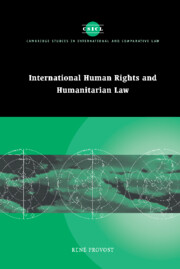Book contents
- Frontmatter
- Contents
- Acknowledgments
- Table of cases
- Table of treaties
- Table of other international instruments
- Introduction
- PART I Normative frameworks
- PART II Reciprocity
- Introduction
- 3 Formation
- 4 Application
- 5 Sanction
- Conclusion to Part II
- PART III Application: law and facts
- General conclusion
- Bibliography
- Index
- CAMBRIDGE STUDIES IN INTERNATIONAL AND COMPARATIVE LAW
5 - Sanction
Published online by Cambridge University Press: 07 September 2009
- Frontmatter
- Contents
- Acknowledgments
- Table of cases
- Table of treaties
- Table of other international instruments
- Introduction
- PART I Normative frameworks
- PART II Reciprocity
- Introduction
- 3 Formation
- 4 Application
- 5 Sanction
- Conclusion to Part II
- PART III Application: law and facts
- General conclusion
- Bibliography
- Index
- CAMBRIDGE STUDIES IN INTERNATIONAL AND COMPARATIVE LAW
Summary
There is a certain measure of overlap between the notions of application and sanction of norms in the international legal system where, owing to the lack of a central implementing authority, self-help still plays a critical role in enforcing law. Sanctions could broadly be defined as the set of rules available, following a breach, to force the resumption of compliance with the law, prevent further violations, or provide reparation. One form of sanction, state responsibility rules on countermeasures, is of particular interest with regard to reciprocity. Human rights law and humanitarian law differ quite markedly with regard to sanctions, mostly due to the greater institutionalisation of human rights. Countermeasures, examined in the first section of this chapter, are more closely associated with humanitarian law, in the form of belligerent reprisals, but nevertheless provide revealing insights concerning human rights law. The second section focuses on the humanitarian rule tu quoque, which represents one facet of individual responsibility involving elements of reciprocity.
Countermeasures
International law rules on state responsibility recognise as a general principle that any state is entitled to take countermeasures when its rights are being trenched upon by the actions of another state. Countermeasures can take the form of the temporary suspension of some obligation otherwise binding on the state taking such measures. Countermeasures have played a critical role in the development and enforcement of humanitarian law, and also raise interesting issues in the context of human rights law.
- Type
- Chapter
- Information
- International Human Rights and Humanitarian Law , pp. 182 - 235Publisher: Cambridge University PressPrint publication year: 2002

